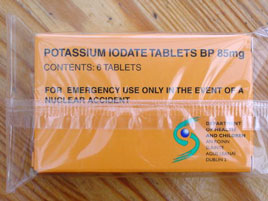
Health Index:
Summer Sun Protection
Cholesterol Drug Withdrawn In Ireland
Asthma
Information
Cancer
Information
Childhood
Infections
Health On Holidays
Holiday
Checklist
Influenza/ "Flu" Vaccine
Travel
Tips
Treating
Minor Ailments
Go to Castlebar
Last Update: Sun Protection - Preventing Skin Cancer"IODINE" TABLETSIodine tablets were recently supplied to every household under the "Nuclear Emergency Plan". Why?"Iodine", supplied as "Potassium Iodate" is an anti-radiation protecting agent and will help prevent development of thyroid cancer in people exposed to fall-out from a nuclear accident (e.g. Sellafield) or a nuclear bomb. Iodine has the ability to prevent the absorption of 99% of radioactive iodine from nuclear fall-out. The World's worst nuclear accident occurred at Chernobyl in 1986 - it scattered radioactive iodine over thousands of miles throughout Europe.  Fortunately, much of the affected area was sparsely populated, and even more fortunate was the fact that the Soviets had large stockpiles of potassium iodate available which they distributed to people living close to the reactor within hours of the accident. In other areas, however, distribution of potassium iodate tablets was much less thorough and , in addition, much of the population was deficient in dietary iodine resulting in iodine deficient thyroid glands taking up greater amounts of radioactive iodine. According to the World Health Organisation, the disaster will cause fifty thousand new cases of thyroid cancer among young people living in the area most affected by the nuclear disaster. Researchers have found that in certain parts of Belarus, for example, 36.4% of children, who were under the age of four at the time of the accident, can expect to develop thyroid cancer. An increase in incidence has been documented in areas up to 500km from the site. It is also note-worthy that in the years following the 1986 Chernobyl accident, thyroid cancer is the only cancer to have seen a significantly increased incidence showing that the greatest risk posed by a nuclear disaster is from the radioactive isotopes of iodine especially.
IODINE (POTASSIUM IODATE) AS THYROID-BLOCKING AGENTSThe thyroid gland - and especially the thyroid gland of children - is vulnerable to atomic injury since it absorbs both non-radioactive and radioactive iodine, and normally it retains much of this element. The amount of iodine taken up by the thyroid is governed by the amount already present. Therefore, a thyroid relatively empty of iodine will take up more iodine than one already replete with it. When non-radioactive iodine is made available in the blood for absorption by the thyroid gland in advance of radioactive iodine, the gland will absorb and retain so much that it becomes saturated with non-radioactive iodine. When saturated, the thyroid gland can absorb only about one percent additional iodine, including radioactive forms that later may become available in the blood. It is then said to be 'blocked'. Excess iodine in the blood is rapidly eliminated by the action of the kidneys. Therefore, potassium iodine, if taken in time, prevents the thyroid gland's uptake of radioactive iodine. "Iodine" tablets must be administered just before or very shortly after exposure to the radioactive iodine. If potassium iodate is administered later than four hours after an individual has suffered an acute ingestion or inhalation of radioactive iodine, its effectiveness as a thyroid-blocking agent is less than 50 percent. Furthermore, after six hours, the blocking action is essentially nil.
KELPAlthough kelp is comparatively rich in iodine, it should be noted that Kelp tablets are not an appropriate alternative to iodine supplement tablets. It is calculated, on the basis of average iodine content of 225 micrograms that 444 Kelp tablets would need to be consumed per day by an adult to provide the same protection as one 130mg Potassium iodate tablet.
ADVERSE EFFECTS OF IODINE RELEASING AGENTSAdverse effects associated with 'iodine' include skin rash, swelling of the salivary glands and 'iodism' ( a metallic taste, burning mouth and throat, sore teeth and gums, symptoms of a head cold and occasionally, stomach upset and diarrhoea). When potassium iodate or iodate is consumed as a prophylactic agent, such adverse effects are obviously outweighed by the benefits and are unlikely because of the short term use. Patients with existing thyroid disease should seek medical advice.
ADVICE TO PATIENTS USING POTASSIUM IODATEPatients taking this medicine for radiation exposure should be advised to:
To store this medicine:
Do not store the tablet form of this medicine in the bathroom, near the kitchen sink, or in other damp places. Heat or moisture may cause the medicine to break down. Liberation of iodine will cause a yellow (acceptable) to brown (unacceptable) discolouration.
DOSINGDosage is as instructed on the package.
|
